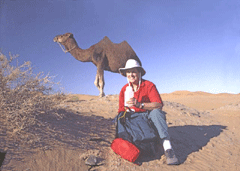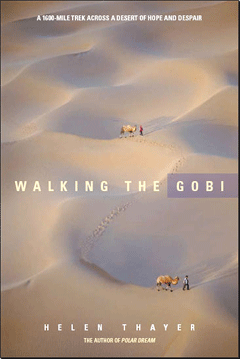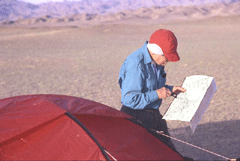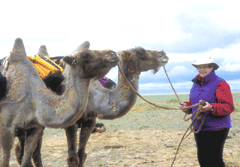Walking the Gobi
Air Date: Week of February 22, 2008

Helen Thayer takes a break on the 1600 mile trek. (Courtesy of Helen Thayer)
1,600 miles of rocky desert stretched out before Helen and Bill Thayer, shimmering in the heat. But the couple was undaunted, braving temperatures of 120 degrees, scorpions, and hostile border guards to bring home an amazing story. They tell Living on Earth’s Bruce Gellerman about their travels and their new book, “Walking the Gobi.”
Transcript
CURWOOD: National Geographic Magazine named Helen Thayer one of the great explorers of the 20th century. Mrs. Thayer has trekked to the North Pole, and Antarctica – she’s traveled across Death Valley and the Sahara. And in 2001, Helen Thayer and her husband Bill, along with a pair of camels they called Tom and Jerry, walked across the Gobi desert - 1,600 miles of blazing heat -where even camels can die of thirst. They lived to tell the tale in Helen’s new book titled, appropriately enough, “Walking the Gobi.”
She told her story to Living on Earth’s Bruce Gellerman.
GELLERMAN: Helen, what does Gobi mean?
THAYER: It means ‘stony desert.’ There are few variations and interpretations but basically it means ‘stony desert’ because there’s only three percent of the Gobi Desert is sand. Most of it is stony.

"Walking the Gobi: A 1600-mile trek across a desert of hope and despair." (Courtesy of Helen Thayer)
GELLERMAN: When I think of Mongolia I think of Genghis Khan, nomads, misery, and some of the most severe temperatures, and severe temperature fluctuations in the world.
THAYER: Well in the wintertime, temperatures can be minus forty degrees quite easily. Snow and ice, blinding snowstorms, winds sweeping down from Siberia. And in fact, in two winters previous to our journey across the Gobi, the Mongolians lost around three million of their animals to the previous two winters’ terrible storms. But then in the summertime, temperatures, as we found, could easily be above 120 degrees and we had a high temperature of 126 degrees Fahrenheit. That’s in the shade. But there was no shade.
GELLERMAN: It’s kind of interesting that in such a barren place, and a desolate place - you are constantly managing to meet people.
Mongolian Nomad boys traveling by camel.(Courtesy of Helen Thayer)
GELLERMAN: You had a GPS device, which sometimes got you lost, and satellite maps. And you asked for directions once on your journey from the nomads and the response was enough to make most people stop in their tracks.
THAYER: Well they told us of course - we knew that if we crossed the border into China we very likely would be shot because we would be accused of being drug smugglers. So we knew there was a danger of certainly being shot but of course we decided that we had permission to be very close to the border. So with navigation we figured that we wouldn’t be crossing the border. It certainly wasn’t our intention. We were forced over by a series of canyons at one point and that wasn’t a very good situation.

Bill Thayer consults the map.
(Courtesy of Helen Thayer)
THAYER: That’s right; they do. It was a close call but in the end we were able to convince them. Of course they could see that we weren’t smugglers. We had nothing on us that would even hint at that and of course the interrogation just went on and on and on. It was ridiculous. We finally got through because of our age.
GELLERMAN: But they asked you that very good question- why are you walking across the desert?
THAYER: That floored him. He couldn’t believe anybody would walk across the desert. In fact nobody, everybody we met in the desert - they had no concept of the idea of anybody walking all the way across the desert because the nomads will - during the winter they stay in one place. It’s a fairly sheltered place. But then in the springtime, summer and fall they’ll move according to the pasture and the food and water. And they follow their ancestral roots. Mongolia is a country with no fences and people basically don’t own land. But they’re constantly searching for food and water.
GELLERMAN: The nomads live in something called ‘ger?’
THAYER: Ger. It’s a ger, it’s pronounced ‘gher.’ It’s like a Russian yurt, but in Mongolian it’s called ger. The door always faces south to avoid the Siberian winds and the visitors are escorted to the left-hand side, which is the male side of the ger and on that side you’re under the protection of the sky god Tengger. And the women of the family go to the right and they’re under the protection of the sun god. And in the back of the ger, it’s very sacred. This is where the elders are allowed to go.
GELLERMAN: And heaven forbid if you hit your head on the doorway.
THAYER: Yeah if you do, if you step on the threshold, it’s considered the same as stepping on your host’s neck. And you mustn’t point your feet at the fire, because you’ll upset the spirit of the fire and he might not cook the next meal.

Helen with the expedition camels, Tom and Jerry.
(Courtesy of Helen Thayer)
THAYER: Yes, it was very serious. A person rear-ended us on a bridge. We were stopped in traffic and this person rear ended us at a very high speed and I had very serious injuries to my lower body, hips, lower back, legs - and I was even told that I might not walk again, certainly not walk long distances again, but I knew that that wasn’t so. So I just searched for the right person and finally I found the person to put me back together again and I’m possibly better than ever because I worked so hard through rehab to strengthen my legs and it’s as though the accident hadn’t happened now.
GELLERMAN: But on your trek across the Gobi, you were hurting.
THAYER: Yes, I was. It was terribly painful. I wasn’t recovered at that time from the accident but we had a choice - we could have postponed it. But then we didn’t know if politics would interfere with our future plans because the Mongolian borders had been closed due to communism for the last 70 years. And with these countries we’ve learned from bitter experience that countries’ borders can close down over night. And so it was wide open, and we had our permits, and we were good to go. And I said to Bill, well, if I don’t give it my best try I will never know if I could make it. And I’d rather give it my best try even if it means that I can’t get all the way across, rather than stay at home and always question myself. So we set out and we were successful.

Helen with the expedition camels, Tom and Jerry.
(Courtesy of Helen Thayer)
THAYER: Oh yes, we chat. We sing songs together. You wouldn’t want to hear us. It’s just as well we go out there to sing because no one would want to hear us sing. It’s just awful. And when things are tough, we bolster each other and we make sure we’re both staying optimistic. We support each other. Or sometimes Bill will start to tell jokes, I might have heard them 20 times already but they’re still funny out there. And then sometimes we see the funny side of what we’re doing and laugh at ourselves. So we manage to get across the desert in good spirits and neither one of us gets down on anything.
GELLERMAN: What might be a Helen and Bill Thayer song?
THAYER: Well we start off with “Onward Christian Soldiers.” It seems to be a good marching song and off we go and that sort of gets us going. And we like that one. That’s sort of our favorite hymns actually.
GELLERMAN: The book is called “Walking the Gobi.” The author is Helen Thayer. Helen, thank you so very much.
THAYER: Thank you.
[MUSIC: Huun Huur Tu “Orai La Boldu-La” from If I’d Been Born An Eagle (Shanachie Records 1999)]
CURWOOD: Explorer Helen Thayer speaking with Living on Earth’s Bruce Gellerman.
Links
Living on Earth wants to hear from you!
Living on Earth
62 Calef Highway, Suite 212
Lee, NH 03861
Telephone: 617-287-4121
E-mail: comments@loe.org
Newsletter [Click here]
Donate to Living on Earth!
Living on Earth is an independent media program and relies entirely on contributions from listeners and institutions supporting public service. Please donate now to preserve an independent environmental voice.
NewsletterLiving on Earth offers a weekly delivery of the show's rundown to your mailbox. Sign up for our newsletter today!
 Sailors For The Sea: Be the change you want to sea.
Sailors For The Sea: Be the change you want to sea.
 The Grantham Foundation for the Protection of the Environment: Committed to protecting and improving the health of the global environment.
The Grantham Foundation for the Protection of the Environment: Committed to protecting and improving the health of the global environment.
 Contribute to Living on Earth and receive, as our gift to you, an archival print of one of Mark Seth Lender's extraordinary wildlife photographs. Follow the link to see Mark's current collection of photographs.
Contribute to Living on Earth and receive, as our gift to you, an archival print of one of Mark Seth Lender's extraordinary wildlife photographs. Follow the link to see Mark's current collection of photographs.
 Buy a signed copy of Mark Seth Lender's book Smeagull the Seagull & support Living on Earth
Buy a signed copy of Mark Seth Lender's book Smeagull the Seagull & support Living on Earth

